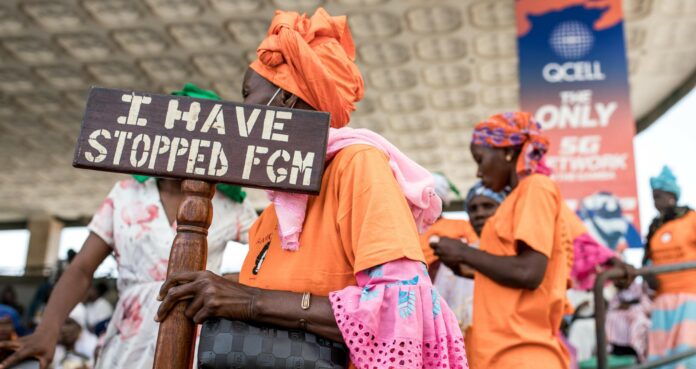By: Adama Sanneh
Survivors and activists are reacting to the rejection of a private member’s bill proposed by Almameh Gibba, a National Assembly member for Foni Kansala. The bill sought to repeal the ban on the criminalization of FGM/C practice under the Women’s Amendment Act in The Gambia, on Monday, 15th July 2024.
Since its introduction, the bill has sparked reactions from civil society organizations, religious leaders, health experts, and the public. Many opinions were expressed regarding its legality, with some believing it to be a religious requirement.
As the bill moved to the committee stage, anticipation was high, with mixed feelings among the public—some hoping for its rejection and others for its passage. The rejection of the bill led to cheerful reactions from FGM/C survivors and activists who supported the ban.
Mariama Fatajo, a survivor, shared her thoughts on the National Assembly’s decision to maintain the ban on FGM/C. “I left everything to go to the National Assembly to see that the law is maintained. At first, I was nervous and speechless, but when the speaker declared the bill rejected, I was happy knowing that my children would be safe from the practice.” She recalled the challenges she faced due to her stance against FGM/C, especially as a survivor. “I have been up and down for meetings, facing backlash from my family. I am not even speaking with my husband’s brother because of this campaign. But I did this for my children and other children who would have undergone the same harmful practices.”
Fatima Jarju, another survivor, shared her feelings after the bill’s rejection. “I felt good, but unfortunately, I was not in the National Assembly due to other engagements in the provinces. However, I watched the proceedings live online. When the speaker read the outcome, I called a friend at the National Assembly several times for updates because my network was bad.” She lamented that she lost connection before the final decision was announced. “I lost network before the pronouncement, but I later checked the group chat and my colleagues were celebrating. We all screamed in the car with some of my colleagues that I was in the field with.”
Additionally, these survivors appeal for the proper implementation of the law against FGM/C, citing that the practice is still ongoing and more girls will be affected if the law is not enforced.
Fallu Sowe, National Coordinator of the Network for Gender-Based Violence (NGBV) and an active advocate against lifting the FGM/C ban, stressed the importance of upholding the ban. “If this ban was lifted, it would have serious consequences on our advocacy to advance the rights of women and girls in The Gambia because FGM is one of the forms of sexual and gender-based violence that traditional norms and cultures perpetuate against women and girls.” Mr. Sowe described the practice as an infringement on the rights of women and girls. For the National Assembly to maintain the ban is a huge achievement. He added that while they do not wish to see anyone punished for practicing FGM/C, if some people continue despite the law, then the law must take its due course.
Despite the ban, some individuals persist in circumcising their girls, raising concerns about the effective implementation of the law and undermining the efforts of activists against FGM/C. Fallu Sowe emphasized continuous engagement with communities, religious and women leaders, and youth. “We will continue education in schools, advocate for government enforcement of the law, and embark on research to provide more evidence that FGM/C is harmful. We aim to educate people about the law and its legal implications and engage in gender-transformative approaches in our communities to ensure that women realize the harmful effects of FGM/C.” He noted that any cases of FGM/C practice would be reported to the authorities.
Sowe also mentioned that if further steps are taken to repeal the ban, they have plans to counter such efforts.
The discussion on repealing the ban on FGM/C has attracted the interest of many international organizations and institutions, which have emphasized the need to maintain the ban. The National Assembly’s decision has received applause from activists and international bodies, describing it as a step in the right direction.
It is worth noting that FGM/C was first banned in 2015, considering it a harmful practice against women and girls. The Women’s Amendment Act states in section 32A (2), “A person who engages in female circumcision commits an offense and is liable on conviction.” The penalties include imprisonment for a term of three years or a fine of fifty thousand dalasis, or both; and where female circumcision causes death, life imprisonment.




